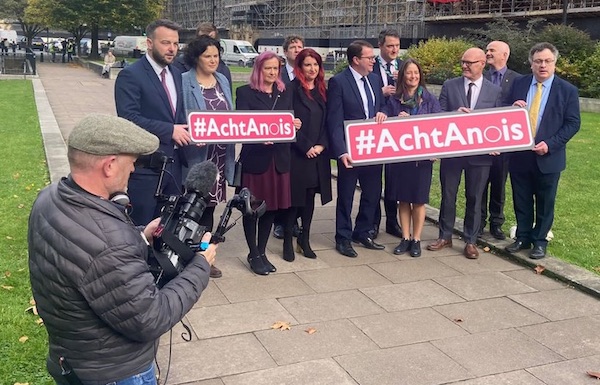
Sinn Féin’s Vice President Michelle O’Neill has said she is not worried by the failure of the British government to honour its commitment to legislate for the Irish language by the end of October.
After almost 15 years of unfulfilled promises, the ‘New Decade, New Approach’ Stormont talks agreement of January 2020 committed to the implementation of Irish language legislation “within 100 days”, but turned out to be another false dawn for language activists.
In June after lengthy negotiations, British Direct Ruler issued a ‘historic’ midnight speech at Stormont, promising to implement a bill which Sinn Féin’s Mary Lou McDonald said had “broken through the logjam” of unionist obstructionism.
The vow eased the way for Sinn Féin and the DUP to agree to the formation of a new power-sharing administration following the DUP purge against their own party leader, Arlene Foster.
Ms O’Neill now says she believes Westminster will legislate for the Irish language “within weeks”, and that a Commissioner will be in place by the end of March.
The Sinn Féin deputy leader also promised the bill being brought forward by Brandon Lewis will include “mechanisms preventing the DUP from blocking it”.
But she added that another broken British promise would not necessarily mean a collapse of the powersharing institutions, saying that she is “not working on the basis of failure”.
A spokesperson for the British government did not explain the delay in implementing the bill, but said that it is “taking the necessary steps” to introduce it “as soon as parliamentary time allows”.
Earlier this week, MPs from six political parties came together to call on the British government to finally deliver the Irish language legislation.
MPs from the British Labour Party, the Scottish SNP, the Welsh Plaid Cymru, Sinn Féin, Alliance, and SDLP joined Irish language advocacy group, Conradh na Gaeilge, at Westminster to call for the delivery of the legislation.
Niall Comer, President of Conradh na Gaeilge, pointed to the “overwhelming majority” represented in the House of Commons.
He added: “The legislation has been agreed and published. The preparatory work within the Executive Office in Belfast has been ongoing. This is ready to go. There is no further legitimate or reasonable excuse for delay. The issue of Irish language rights remains a continuous immediate litmus test for all.”
Dr Pádraig Ó Tiarnaigh from Irish language advocacy group An Dream Dearg said that for the British government not to deliver on its commitment now would leave its credibility “in further ruin”.
“Any attempt to further delay this legislation must be resisted by Sinn Féin, who brokered this deal with the secretary of state in June, and also by the cross-party coalition both at Stormont and at Westminster who support the immediate introduction of Irish language legislation,” he said.
![[Irish Republican News]](https://republican-news.org/graphics/title_gifs/rn.gif)
![[Irish Republican News]](https://republican-news.org/graphics/title_gifs/harp.gif)

